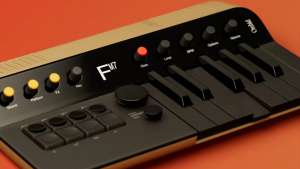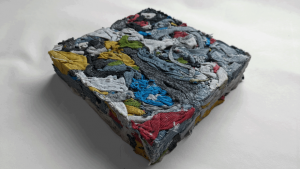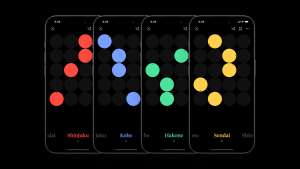
Aragorn23 is an experimental musician who creates algorithmic and movement-based compositions. His most recent project is called Sound of the Eye, a musical translation of the dynamics that make up the human eye.
If you send him an image of your eye, he’ll use features such as iris colour, pupil size, brightness and saturation to determine musical parameters, such as key, dynamic range, octave distribution and density, within a predefined spectrum. With a bit of added “randomness”, this data is combined in Supercollider, a programming language for musical composition. The end-result is a once-off piano composition, lathe cut onto vinyl. Because of the real-time nature of this process, a different variation can be cut onto each record – your eye composition is thus a unique piece of art.
Listening to the composition of my eye – a minimal, see-sawing progression reminiscent of something Philip Glass might do – felt like going on a tranquil journey, further and further into the depths of an unknown world, that’s somehow very familiar. So does our eye’s music represent something about our inner selves? After all, many believe that the eyes are a window to the soul.
“I don’t think there are any profound truths to be uncovered via this process, although there are some wonderful discoveries to be made. That said, if some people experience listening to the music composed ‘by their eye’ as though it reflects something essential about them, who am I to judge?”
Aragorn explains that it’s more of a playful exploration of the many combinatorial possibilities one has. But there’s also a motivation to use personal data and algorithmic processes for creativity instead of control. In an age of data mining, where algorithms coerce us into buying things we don’t need and can spread fake news for propaganda purposes, he hopes his work will spark a thought-process.


“If we want to build meaningful resistance to what some theorists term ‘algorithmic governance’ then we need to familiarise ourselves with these new mechanisms of biopolitical modulation and control in order to understand both how they function and hopefully also how they can be subverted.”
People currently think about algorithms and automated processes such as AI in a very distinct way, thinks Aragorn. “We could term it ‘algorithmic reason’ or the idea that there’s something sufficient in describing and regulating social processes across all scales with simple descriptive programmatic frameworks, as though reality is as simple and linear as a SimCity game.” But, he says, it’s important to remember that – for better or worse – human intervention will always play a role in algorithmic systems because we determine their use. On a poetic level, he wants to challenge this idea that algorithms require a reduction in human agency or creativity.
To Aragorn, creativity is a necessary collective pursuit, a sum of many variables at work. “Sound of the Eye, for instance, is at minimum an assemblage of code, eye images, my creative input and a record-cutting cutter,” he says. There’s interplay between chance and determination, but no final control over the outcome – he’ll never know exactly what the composition will sound like when he creates it. He describes this as “non-mastery,” “I’ve never liked the idea of ‘mastery’ – that at some point we gain some kind of conclusive traction over the possibilities or scope of whatever domain we’re exploring.”

So does non-mastery relate to a world view or a vision for a better future? Although Aragorn has never drawn explicit links between his creative indulgences and his politics, he thinks that this ethos is best expressed in a political theory: anarchism. “How can we summon that in the present?” he asks. His favourite philosophers are Deleuze and Guattari, who argue that “through rupture, decoupling and drift – destabilisation of coded practices and territories – the new becomes possible.” Aragorn’s work seems to mirror this idea, like a metaphor for all the countless ways the world could be if one explores beyond the rules.
For more on Aragorn23 visit https://www.further.co.za/asqus and to order a vinyl with music of your eye, visit soundoftheeye.co.za.







